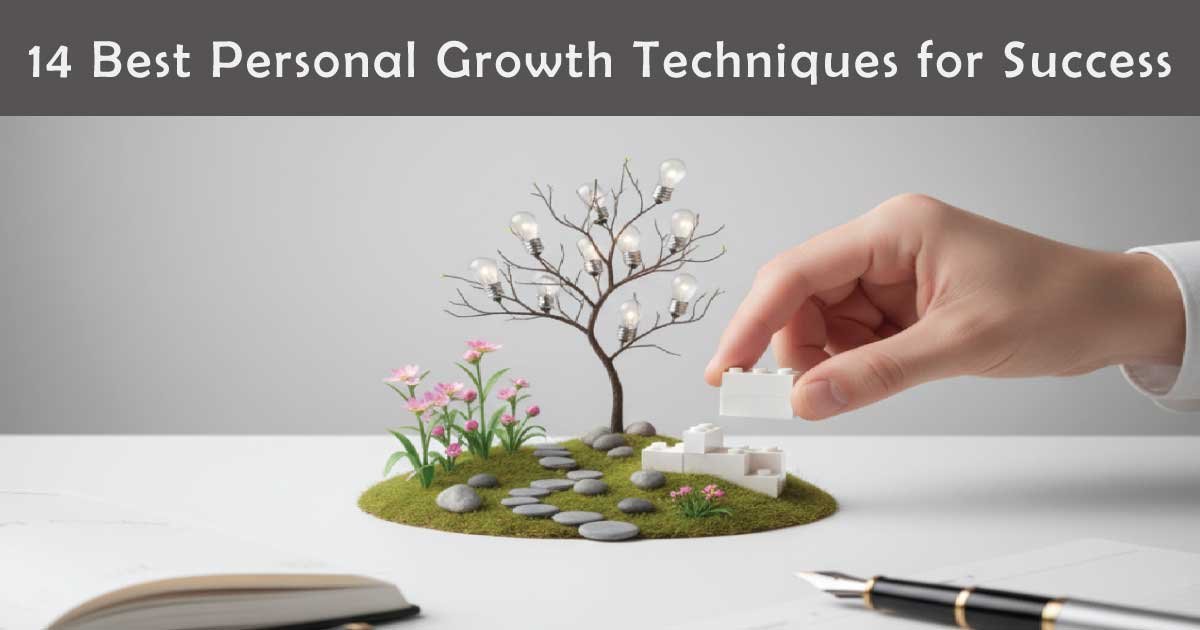Every person has the potential to grow, improve, and become a better version of themselves. Personal growth is not about reaching perfection, it’s about progress, learning, and steady self-improvement. Whether you want to build confidence, develop new skills, improve your mindset, or simply live with more purpose, practicing personal growth techniques can make a significant difference.
In today’s fast-paced world, where distractions and stress can easily take over, focusing on personal development gives you clarity, resilience, and direction. The good news is that growth is not limited to a specific age, profession, or background. Anyone can adopt small, consistent practices to unlock their potential.
This guide will cover effective personal growth techniques that you can start using today.
1. Practice Self-Awareness
The foundation of personal growth is self-awareness. If you do not understand who you are, what you value, and what holds you back, it becomes difficult to move forward.
Reflection: Take time to regularly reflect on your thoughts, actions, and emotions. Journaling or meditation can help you recognize patterns in your behavior.
Feedback: Ask trusted friends, colleagues, or mentors to share honest feedback. Sometimes others notice things about us that we overlook.
Identify values: Clarify what truly matters to you, family, creativity, financial stability, faith, or freedom. Aligning your actions with your values leads to authentic growth.
When you become self-aware, you can make better decisions and stop repeating mistakes.
2. Set Clear and Achievable Goals
Growth without direction feels like wandering without a map. Setting specific, measurable, achievable, relevant, and time-bound (SMART) goals ensures you move forward with intention.
For example:
Instead of saying, “I want to get healthier,” try, “I will exercise for 30 minutes five times a week for the next three months.”
Instead of saying, “I want to read more,” try, “I will finish one book each month.”
Breaking big goals into smaller milestones helps you stay motivated. Celebrate progress, no matter how small, it keeps momentum alive.
3. Embrace Lifelong Learning
The world is constantly evolving, and the most successful people are those who never stop learning. Growth comes when you feed your mind with knowledge, new skills, and fresh perspectives.
Ways to practice lifelong learning:
Read books, articles, or blogs in your area of interest.
Take online courses or attend workshops.
Learn a new language or hobby.
Listen to podcasts or audiobooks during commutes.
Learning is not only about professional skills, it can be personal too, like cooking, photography, or gardening. Every new skill you learn adds confidence and enriches your life.
4. Cultivate a Growth Mindset
Psychologist Carol Dweck introduced the concept of fixed vs. growth mindset. A fixed mindset believes abilities are unchangeable, while a growth mindset believes skills and intelligence can be developed through effort.
Examples of shifting your mindset:
Instead of saying, “I’m not good at this,” say, “I can get better with practice.”
Instead of thinking, “I failed,” think, “This is a chance to learn.”
A growth mindset makes you more resilient, optimistic, and open to challenges.
5. Build Healthy Habits
Your daily habits shape your life more than big events do. Even small positive habits, when repeated consistently, create powerful results.
Some life-changing habits include:
Waking up early and using mornings productively.
Practicing gratitude by writing three things you’re thankful for each day.
Exercising regularly to boost energy and mental clarity.
Eating balanced meals to fuel your body.
Limiting screen time to reduce stress and improve focus.
Focus on building one habit at a time instead of overwhelming yourself with too many changes at once.
6. Develop Emotional Intelligence (EQ)
Emotional intelligence is the ability to understand and manage your emotions—and also to understand others’ feelings. It plays a huge role in relationships, work success, and personal happiness.
Ways to strengthen emotional intelligence:
Practice empathy, put yourself in others’ shoes.
Manage stress by breathing deeply or taking a pause before reacting.
Be aware of your emotional triggers and learn to handle them calmly.
Improve communication, listen actively, not just to respond.
When you master emotional intelligence, you handle conflicts better, build stronger connections, and avoid unnecessary stress.
7. Step Outside Your Comfort Zone
Real growth rarely happens in comfort. If you always do what feels safe, you will never discover your full potential.
Examples of stepping out of your comfort zone:
Speaking up in meetings when you usually stay quiet.
Traveling to a new place on your own.
Taking on a new role or responsibility at work.
Learning a skill that intimidates you, like public speaking or coding.
At first, it feels uncomfortable, but each step builds courage and expands your opportunities.
8. Manage Time Effectively
Personal growth also means learning how to use your time wisely. Time is the most valuable resource—you can’t get it back once it’s gone.
Effective time management techniques:
Use a planner or digital calendar to organize tasks.
Apply the “80/20 rule” (Pareto Principle): focus on the 20% of tasks that bring 80% of results.
Break work into focused intervals using the Pomodoro technique.
Prioritize tasks, do important ones first before distractions take over.
By managing time well, you reduce stress and create more space for growth activities like learning, exercising, or reflecting.
9. Practice Gratitude and Positivity
Gratitude transforms your mindset. When you focus on what’s going right instead of what’s missing, you become more content and motivated.
Ways to practice gratitude:
Keep a gratitude journal.
Say thank you more often, to people and for opportunities.
Reflect on past challenges and appreciate how far you have come.
Pair gratitude with positivity. Positive affirmations such as “I am capable,” “I am learning,” or “I am worthy” may feel small, but over time they rewire your mindset.
10. Take Care of Your Health
Physical, mental, and emotional health are the pillars of growth. Without energy and balance, personal development becomes difficult.
Exercise regularly to boost physical fitness and release endorphins.
Eat nourishing food to fuel your brain and body.
Sleep well (7–8 hours per night) for better concentration and emotional stability.
Practice mindfulness to reduce stress and improve focus.
A healthy body supports a healthy mind and both together allow for sustainable growth.
11. Build Strong Relationships
Humans thrive on connection. Personal growth is not just about individual improvement but also about building meaningful relationships.
Surround yourself with supportive, positive people.
Learn to communicate openly and respectfully.
Let go of toxic relationships that drain your energy.
Network with people who inspire and challenge you.
Good relationships bring joy, encouragement, and new opportunities for learning.
12. Develop Financial Discipline
Money plays a big role in personal freedom and peace of mind. Growing financially responsible helps you live with less stress and more control over your choices.
Steps to improve financial growth:
Create a monthly budget and stick to it.
Save a percentage of your income consistently.
Avoid unnecessary debt.
Invest in knowledge before investing in risky ventures.
When your finances are stable, you gain confidence and freedom to focus on other growth areas.
13. Learn to Adapt and Be Resilient
Life is full of changes, challenges, and unexpected turns. Personal growth requires the ability to adapt and bounce back from difficulties.
Ways to build resilience:
Accept that failure is part of success.
Focus on solutions rather than problems.
Keep faith and hope alive during tough times.
Learn lessons from setbacks instead of dwelling on them.
Resilient people do not let obstacles define them, they use challenges as stepping stones.
14. Give Back and Help Others
Personal growth is not only about yourself. Helping others creates purpose, humility, and a sense of fulfillment.
Ways to give back:
Volunteer your time for a cause you care about.
Share your knowledge with those who are learning.
Offer emotional support to friends and family.
Donate to charities when possible.
When you give, you grow in empathy, gratitude and perspective.
Conclusion
Personal growth is a lifelong journey, not a final destination. By practicing self awareness, setting goals, building habits, and nurturing relationships, you create a life filled with purpose and progress. The techniques we have discussed, such as embracing lifelong learning, cultivating a growth mindset, managing time, and taking care of health are practical steps anyone can take.
Remember: you do not need to change everything overnight. Start small, stay consistent, and trust the process. Over time, these personal growth techniques will help you become more confident, resilient and fulfilled.
Your growth journey is unique, embrace it fully, and keep moving forward one step at a time.
Also Read:
FAQs on Personal Growth Techniques
1. What are personal growth techniques?
Personal growth techniques are practical strategies that help individuals improve their mindset, habits, skills, and overall lifestyle. These techniques include goal-setting, self-awareness, time management, healthy routines, and lifelong learning. By practicing them consistently, you build confidence, resilience, and success. They are not one-size-fits-all everyone can adapt techniques according to their unique life goals, personality, and circumstances. Growth happens gradually through small, steady improvements.
2. Why is personal growth important in 2025?
In 2025, life is more fast-paced and competitive than ever before. Personal growth helps you stay adaptable, emotionally strong, and focused on meaningful goals. It equips you with skills like resilience, problem-solving, and time management that are vital in today’s changing world. Growth also improves your career prospects, relationships, and mental health. By investing in self-improvement, you remain relevant, confident, and prepared for future opportunities and challenges.
3. How do I start my personal growth journey?
Start by becoming self-aware, reflect on your strengths, weaknesses, and values. Then, set clear and realistic goals, focusing on one or two areas at a time. Introduce small positive habits like journaling, gratitude practice, or daily exercise. Be consistent, track your progress, and celebrate small wins. Also, surround yourself with supportive people and never stop learning. Growth begins with simple, intentional steps taken daily toward a better version of yourself.
4. What are examples of daily habits for personal growth?
Daily habits that support personal growth include waking up early, exercising for at least 20 minutes, practicing gratitude, journaling thoughts, and reading books. Other powerful habits are limiting social media use, meditating, and eating balanced meals. Consistency matters more than intensity, small daily improvements add up to big results over time. By making these routines part of your lifestyle, you strengthen discipline, focus, and self-confidence naturally and effectively.
5. Can personal growth improve my career success?
Yes, personal growth directly boosts career success. When you develop skills like communication, time management, and emotional intelligence, you perform better at work and build stronger relationships. A growth mindset makes you adaptable to change, while discipline and confidence help you take on new challenges. Employers value professionals who are proactive and self-improving. By investing in personal development, you increase opportunities for promotions, leadership roles, and long-term career growth.
6. How does emotional intelligence support personal growth?
Emotional intelligence (EQ) is the ability to understand and manage emotions in yourself and others. It helps you handle stress, resolve conflicts, and build stronger relationships. With high EQ, you become more empathetic, self-aware, and resilient. This creates healthier personal and professional connections, reduces misunderstandings, and increases success. In short, EQ strengthens both mental well-being and communication skills, making it an essential part of personal growth in 2025.
7. How can I stay motivated on my personal growth journey?
Motivation comes from clear goals, small wins, and positive reinforcement. Break big goals into manageable steps and track your progress. Celebrate milestones, even minor ones, to maintain momentum. Surround yourself with supportive people and consume uplifting content like motivational books or podcasts. Remind yourself why you started whenever challenges arise. Most importantly, stay consistent, discipline often sustains progress more than motivation, and steady effort leads to lasting personal growth.

Hassan Chaudhry is a poet and writer who explores healing, self-growth, and everyday inspiration. His words come from real experiences and honest reflections — written to heal hearts, spark hope, and remind readers that every moment is a new beginning. He is the creator of Poems Nest, a space where poetry and positivity come together to inspire hearts.

